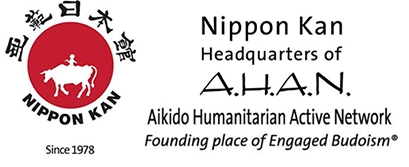By Kazumi Yoshimura
April 2nd, 2005
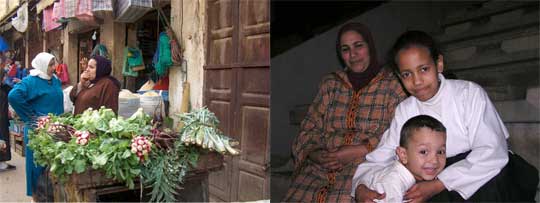
Why do people want to travel? To visit spectacular places? Enjoy exotic cuisine? Escape their own reality? Everyone can agree that these are legitimate reasons and I would like to add one more of my own; to immerse oneself in an unfamiliar surrounding. Doing this definitely forces us to think about our own lives from a different perspective.
My name is Kazumi Yoshimura. I am a Japanese native who came to the U.S. over twenty years ago. I did not know much about Aikido or Homma Sensei until a few years ago when I started training in Aikido at Nippon Kan regularly. Last March I happened to be extremely lucky to go on the Morocco trip with Homma Sensei and Emily Sensei. The purpose of our trip was to learn about women and Aikido in Morocco. We also had a seminar organized by Moroccan Aikido Association featuring Homma Sensei and Aloui M’barek Sensei, who was the chief instructor of Morocco. I am thrilled to announce that our trip was very successful and the seminar was well received. Not only did we meet amazing people, but we also learned a great deal about the rich history of Aikido in Morocco.
From a personal perspective, this trip really made me examine the way I view myself and the small world around me. I naively thought my way was sound and normal. I would like to share my personal thoughts and reflections about my own life which were triggered by some women I met in Morocco.
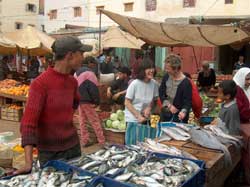
Teruyo-san and Emily Busch shopping
in the local markets.
The first woman I met was Mrs. Teruyo Sano who is a Japanese native just like me. She fell in love with Morocco after she visited this country twenty five years ago. Today she is the wife of a Moroccan man, mother of four children, and a successful businesswoman who owns a poplar restaurant on the main street in Rabat, the capital city of Morocco. Teruyo-san is fluent in Arabic, French, and English. She is a Shodan in Karate and recently began practicing Aikido. She is no stranger to Morocco. She has blended in with Morocco and she has grown to cherish it. Teruyo-san was the first person we met upon arriving at the Casablanca airport in Morocco. She welcomed us with a big smile and cheerful bows, just like old friends who have been apart for a long time and have missed each other.
On the way back to Rabat, Teruyo-san shared her passionate stories about Morocco. Listening to her truly gave us a wonderful impression of this country, which we only knew from the guidebooks we had read. It would have been a totally different experience for us if we hadn’t had a chance to meet her. You could sense that she was deeply in love with this country. Teruyo-san is a very petite woman. However, I was utterly moved by her positive attitude, strong spirit, and tremendous energy level, which certainly seemed to make her look tall, stand with confidence, and walk swiftly with big strides.
It was Teruyo-san who primary took care of us during our one week visit. Watching Teruyo-san prompted me to compare my life to her life. On the surface there are some similarities between Teruyo-san and I, but there are obviously critical differences too.
Is there any doubt in anyone’s mind which country would be easier to move into, the U.S. or Morocco? I think it must have been incredibly challenging for Teruyo-san to make Morocco her home. Imagining her struggles compared to mine made me realize what an extraordinary woman she is. Did I fall in love with the U.S. the way that Teruyo-san fell in love with Morocco? Did I work hard to learn this country’s language and understand the culture and customs? Have I been dealing with my life positively? Have I been accepting of things that I cannot change but making improvements to the things I can control? I fear that my answers are not as great as hers.
I remember how difficult it was for me to start a new life in the United States. For example, something difficult that was small, such as ordering food in restaurants and something big that was difficult, like raising my children in a different environment. I still take many things for granted and forget to be appreciative. How embarrassing. Next time, when I have a visitor from another country to my home, I want to share my gratitude with him/her about how much the U.S. has contributed to and shaped my life.
Before the seminar in Casa Blanca, Homma Sensei jokingly mentioned, “I would be more than happy if the seminar will be held at a small town dojo and there are ten students join.” As turned out the seminar was a success beyond our expectations. It was held at a big indoor soccer stadium and more than one hundred and fifty students attended. Homma Sensei opened the seminar with his famous great sense of humor. It didn’t take much time before he had captured the huge audience. Emily Sensei did many demonstrations with Homma Sensei as his uke. This arrangement worked splendidly well. I was absolutely impressed with the excitement and enthusiasm from the attendees.
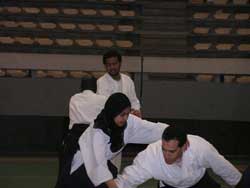
Women Aikidoist in Morocco.
At the seminar, most students were wearing hakama. There were five female students who were also wearing hakama. Most of them had their heads covered with a veil but not their faces. All of them had a committed look that indicated they were serious about practicing Aikido. As matter of fact, as I watched the female students practicing with male students, I thought they were all were brilliant. They appeared to be at the same skill level as many of the male students. In addition, all of the female students were quite young compared to the male students whose average age could have been mid-thirty or forty. With my minimum understanding of the religion in Morocco, I was very curious about these young women with their excellent skill level. How did they get so good? It was unmistakable that they have been practicing Aikido for a long time. They must have started when they were very young. I imagine it must have been difficult to practice Aikido under the restrictions placed on the women in Morocco due to religious beliefs and traditions. All of them must be remarkable individuals who chose to train in Aikido. What was their motivation, I wondered?
My motivation for taking the beginner’s Aikido class at Nippon Kan was very simple. I wanted to be able to sit in the kneeling seiza position to regain the full range of motion of my right leg after the knee surgery. My goal was fulfilled relatively easily. Then my expectations of Aikido changed. I discovered there were many outstanding Aikidoists and instructors within our dojo and outside as well. The more I learned about them, the more I wanted to be like them. Improving my skills became my new goal. The speed of my progress became very important for me. Some say it is a natural desire, but at the same time, I was more and more frustrated with my hopelessly slow progress. Worse, I started to compare myself to those around me. I was struggling to find peace of mind, while practicing at a most friendly, non-competitive environment. Clearly I did not understand what I really wanted from Aikido. Then the Morocco trip came up, Homma Sensei asked me to accompany with him. I felt so inadequate about my skills to go outside our dojo representing Nippon Kan yet I knew Homma Sensei would not have expectations of me that he did not think I could fulfill. Still, I could not help feeling stressed about the upcoming trip.
When the seminar in Casablanca finally arrived, I was filled with uneasiness. I felt tense, nervous, confused, and scared but I pretended I was not. I was fortunate to practice with one of the young female students. She was the second woman I met in Morocco who had a major effect on me. Her techniques were very skilled, sharp, and precise. While practicing with this young female student however, I sadly found myself busy figuring out how to impress her. This I decided was not the way to value her time and effort. Not wanting to spoil this rare opportunity I focused on the practice that was happening at the moment.
When I calmly think back to the purpose of the trip, which was to learn about the women and Aikido in Morocco, practicing with the female students at the seminar was supposed to be one of the highlights of the trip. If I had been more relaxed, I definitely feel I could have learned more from her. At least I did enjoy practicing with her, even though I felt my Aikido was no match to hers.
The attitude of the young female students towards their practice of Aikido seemed much more serious than mine. They must be training in Aikido diligently to achieve their own personal goals. I predict some of these women who have broken barriers to achieve what they have, might become the first local female instructors in Morocco. When I think about what I want from Aikido, I realize that my Aikido will never go beyond a recreational level and my skills may continue to stay at this level forever. However this trip has caused me to reflect on how critical it is for me to obtain a higher rank or being viewed as an expert? After practicing with the female students here, I understood what was missing in my Aikido. I was missing the mind, not the skills, the mind that can strive and concentrate on doing its best under any circumstances. My goal should be to enjoy the practice of Aikido, not to be obsessed with the level of Aikido. Nothing should be more important than valuing every single practice. I learned from this experience that it is more essential for me to focus on developing my mind than attaining better skills. What a wonderful gift I had received from my practice in Morocco.
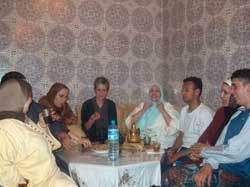
Alaoui Sensei’s wife
(woman with the blue scarf)
The third woman I met was a wife of the head instructor, Alaoui M’barek Sensei of Morocco Aikido Federation. I learned that Alaoui M’barek had two wives. The night before we were scheduled to leave Morocco, we were invited to his first wife’s house for dinner. The house was located in the middle of the medina where we had walked earlier that same afternoon. It was impossible to visualize the inside of any of the houses by seeing them from ouside above the narrow streets. What a surprise we had when we were led into the same medina and were escorted into a beautiful house with rooms covered with intricate titles floor to ceiling. We were so fortunate to be invited to a magnificent hidden palace in the medina!
The dinner was absolutely scrumptious and the hospitality was just incredible. The delicious couscous was served in an enormous bowl and later we learned that couscous is usually served only on Fridays. It was Sunday night so it was obvious that they taken extra effort to cook that special dish to welcome us. As the dinner was served, the house started to fill with many people; Alaoui Sensei’s students, his family members and friends.. There were two round tables in the room, one at each end of the large room we were seated in. Although the men and women were seated at the separate tables, loud laughter constantly erupted during joyful conversations at both tables. Everyone was indeed having a great time!
After the dinner Emily Sensei and I moved from the men’s table to the women’s table and we tried to communicate with them in English. It was not easy until Alaoui Sensei’s first wife brought her daughter’s wedding photos. The conversation took off! There were so many topics in common between us like the wedding gowns and jewelry the gorgeous bride was wearing. About that time, we learned that there were children from Alaoui Sensei’s second wife with us in the same room. I was simply amazed how everyone seemed so comfortable together and has formed a one large happy family. I had been sitting next to Alaoui Sensei’s first wife. She was a very gentle, sweet, and warm woman who was the kind of mother anyone would love to claim as theirs. She looked very content with her life. However, I just could not shake off the fact that she was one of two wives.
Soon I realized that I was trying to understand her life based on my limited knowledge, experience, and values. The women of Casa Blanca were quite westernized and modern in some ways, but I realized how dangerous it could have been to imposes my value system here on what is normal and what is not. When I reflected on my own life compared to hers and attempted to determine who was happier, I simply couldn’t decide.
When I was young, I didn’t want to accept the values of the Japanese traditions and culture of my parents and I didn’t appreciate the background that I was raised in. In a nut shell, I didn’t like the world I had come from. When I came to the U.S., I thought I had escaped from the old rigid world of Japan. I was young, and arrogant enough to believe that the American way of life was the best way and I wanted to breathe as much freedom as I could. As I look back on my journey in a non-Japanese country as a Japanese mother, I regret that I did not possess a solid Japanese cultural foundation but also that I didn’t focus on passing down something of the values my parents attempted to pass on to me to my own children. I liked the idea that my children could live any kind of life they would choose for themselves. Giving free choices to my children made sense to me because that freedom of choice was attractive to me when I came to this country. Apparently free choice works well for people who have a clear vision of how to use it. Now I am in doubt whether my intentions were wise and selfless enough to prepare my children for their future.
On the other hand, Alaoui Senseis first wife, who lives what seems to be a very conventional life in Morocco seemed so happy surrounded by her daughter, grandchild and friends. I reflect on the fact that my mother has met with my daughter only a handful of times in the last twenty years. My free choices have caused some scars in my family. I will be extremely lucky if my children decide to stay close with me when they are grown, but I can’t count on it. Meeting with Alaoui Senseis first wife made my heart ache, and made me think about what I could have done differently in prioritizing my family’s values and traditions over my personal choices.
I wished I could have spoken either Arabic or French so that I might have been able to learn a little bit more about her life. Wouldn’t it be fascinating to hear her stories about being the first wife of a highly respected Instructor in Morocco!
I met these three women in Morocco at different places and in different times. Although they have been connected in my experience by Aikido they don’t know each other and their paths may never cross. Never the less, in my mind, they are all together. When I recall the trip, their faces pop up in my head faster than any other images. I am truly grateful for them because they made a huge impact on me. The impact on my life has provoked me to search more answers.
I would like to express my sincere gratitude to all of the people who made this honorable opportunity possible for me. The whole experience has given me many new perspectives that I never imagined possible. Thank you very much.
Domo Hontouni Arigato Gozaimashita.
Related articles:
Aikido, a New Wind in Morocco; a Woman’s Perspective.
Nippon Kan Vice President, AHAN President Visits Morocco.
Preserving Our Traditional Heritage.
